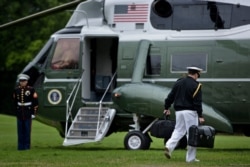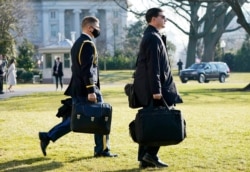The president of the United States, always accompanied by a military aide carrying a satchel containing nuclear launch codes, has sole authority to order nuclear warfare or respond in kind to such an enemy attack.
Now, lawmakers of the current president’s own party are asking President Joe Biden to surrender that unilateral power.
Giving one person such authority “entails real risks,” according to a letter endorsed by 31 Democratic members of the House. “Past presidents have threatened to attack other countries with nuclear weapons or exhibited behavior that causes other officials to express concerns about the president's judgment.”
The letter, led by Representatives Jimmy Panetta and Ted Lieu, both from California, calls for officials, such as the vice president and speaker of the House, to concur with a launch order before it can be issued.
“My colleagues and I are requesting a straightforward review of our nation’s nuclear command-and-control structure to determine how we can have a safer nuclear weapons launch authority, not to jeopardize but to enhance and bolster our national security,” said Panetta in a statement to VOA on Thursday.
“Based on our president’s distinguished record and leadership on nuclear arms control, for our country’s nuclear forces, we’re recommending that he continue his thoughtful and professional analysis of ways for additional checks and balances within the nuclear command-and-control structure.”
The letter, which was sent to the White House on Monday, “proposes several alternatives to investing the president with the sole, unchecked and final authority to order the use of nuclear weapons,” Jeffrey Lewis, a professor and a director at the James Martin Center for Nonproliferation Studies at the Middlebury Institute of International Studies at Monterey, California, told VOA. “Any of the alternatives would be better than the current arrangement.”
On January 8, two days after a mob supporting then-President Donald Trump stormed the Capitol, House Speaker Nancy Pelosi told her fellow Democrats she had spoken with the chairman of the Joint Chiefs of Staff “about preventing an unstable president” from ordering a launch of nuclear weapons.
"The situation of this unhinged president could not be more dangerous, and we must do everything that we can to protect the American people from his unbalanced assault on our country and our democracy," Pelosi said in a letter.
The letter to Biden from the Democratic lawmakers, including two members of the House Armed Services Committee, mentions Trump by name only in the footnotes, as well as referring to concerns about the mental stability of President Richard Nixon shortly before he resigned in August 1974.
“Since there are inherent risks in the present system, as was made apparent by our ex-president, it’s our responsibility in Congress to ensure that the administration conducts this type of review in order to have a safer, more secure nuclear weapons launch authority,” Panetta told VOA.
“The old argument was that it was safe to give the president this power because the election was the ultimate safeguard,” Lewis said. “Trump’s election shows that an unfit, amoral and dangerous person can, in fact, gain power in the United States.”
Trump, during a period of feuding with North Korean leader Kim Jong Un, boasted that his nuclear button was “much bigger” and “more powerful” than the one possessed by Kim.
The proposed change is being criticized by three prominent Republican members of the House Armed Services Committee.
In their statement, Liz Cheney, Mike Rogers and Mike Turner contend “the president of the United States must have the exclusive ability to command and control our nuclear deterrent. Democrats’ dangerous efforts suggesting a restructuring of our nuclear command-and-control process will undermine American security, as well as the security of our allies.”
The Democrats’ recommendations, “if enacted, would leave Americans vulnerable, destabilize the nuclear balance and shake our allies’ confidence in the nuclear umbrella,” according to the three Republicans. “Vladimir Putin and Xi Jinping would cheer if the United States adopted such a unilateral restriction.”
John Maurer, a visiting scholar at the American Enterprise Institute, is also concerned about altering how a president can respond.
“More important than speed is predictability,” Maurer told VOA. “Deterring adversaries requires that adversaries know that American warheads will fly under certain circumstances. Perhaps more importantly, reassuring American allies requires that American warheads fly under certain circumstances in their defense.”
American law already contains provisions that can check presidential launch authority, according to Maurer, who is also a professor of strategy and security studies at the School of Advanced Air and Space Studies at Air University, headquartered at Maxwell Air Force Base.
“The vice president and Cabinet can suspend a president's powers under the 25th Amendment if they are really concerned about his mental state, which effectively suspends his ability to launch nuclear attacks,” Maurer said. “American military officers can also refuse to carry out unlawful orders. A blanket check on presidential authority is unlikely to accomplish much more than these existing provisions already do.”
Maurer added, “It’s not clear to me that a check on the president's nuclear authority by Congress would be constitutional. The Constitution establishes that the president is the commander in chief of the U.S. military, so Congress' ability to tell him what to do with nuclear weapons under military control may be limited.”
Ankit Panda, a nuclear policy senior fellow at the Carnegie Endowment for International Peace, argued that while sole authority made sense during the Cold War, times and circumstances have changed.
“In the post-Cold War environment — and in particular, after President Trump — sole authority is seen as a liability,” Panda told VOA. “First-strike concerns are less acute. Command and control is robust and still modernizing. So, the U.S. can and should explore alternative postures.”
No choice, when it comes to the authority for launching nuclear weapons, will be entirely risk-free, Panda acknowledged, “but we need to think about what kinds of risk we’re willing to live with when it comes to our own nuclear posture.”
“I would certainly have to look at the letter and talk to our national security team,” replied White House Press Secretary Jen Psaki when asked on Friday aboard Air Force One about the Democrats’ letter. “I have not seen the letter. I can talk to them and see if we can get you a response.”
VOA White House correspondent Patsy Widakuswara contributed to this report.










